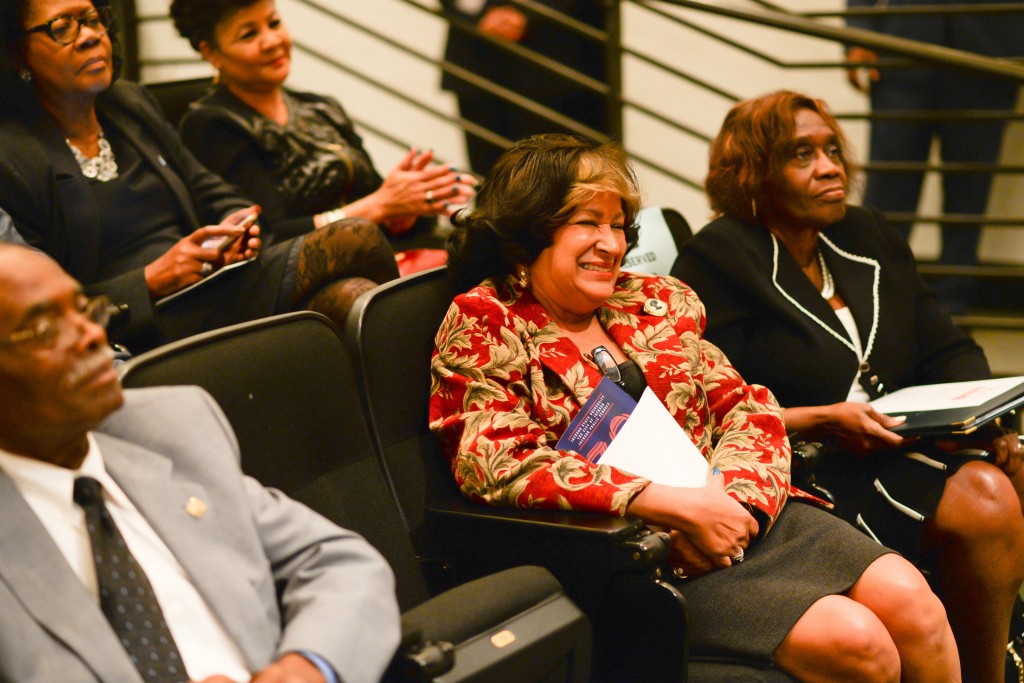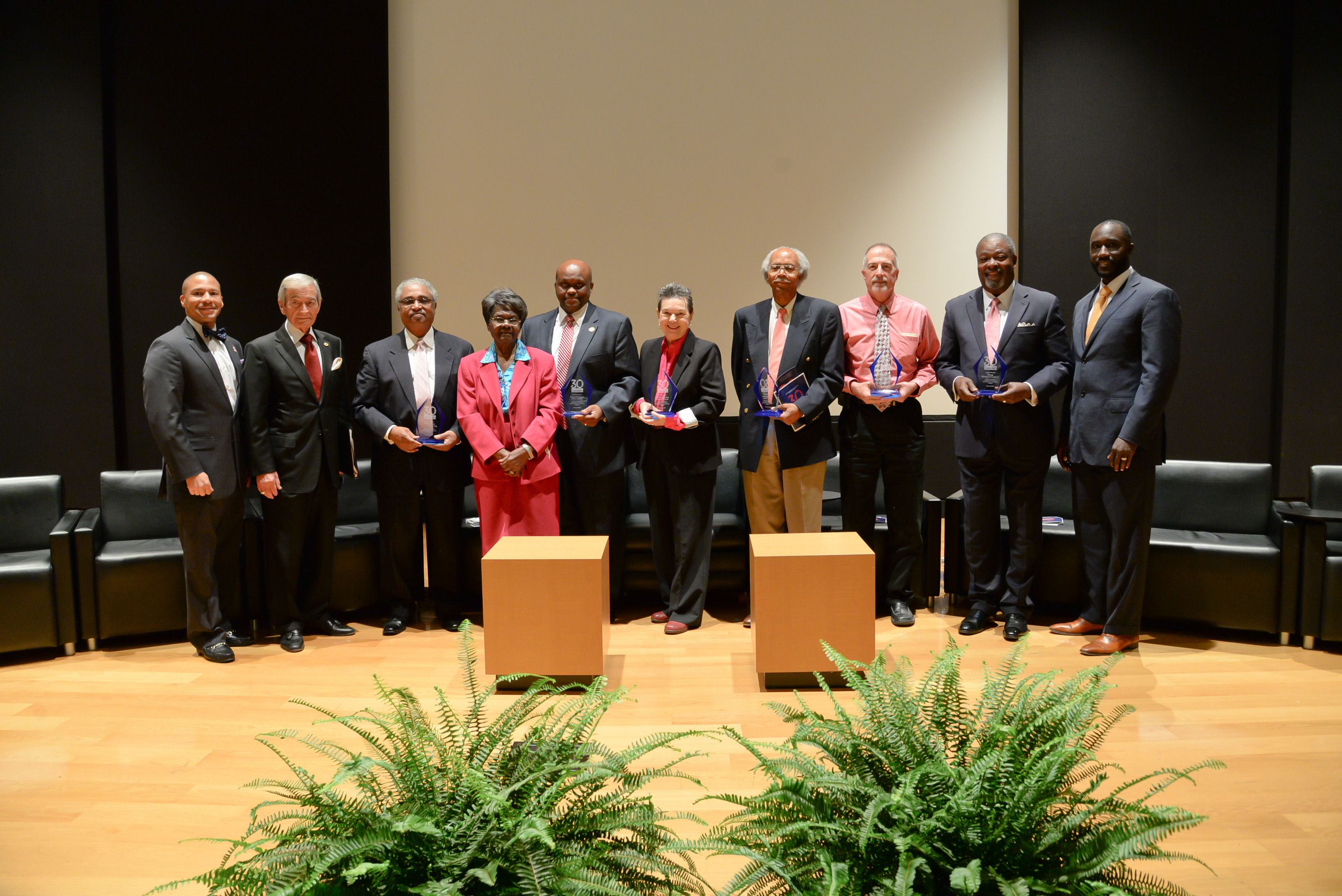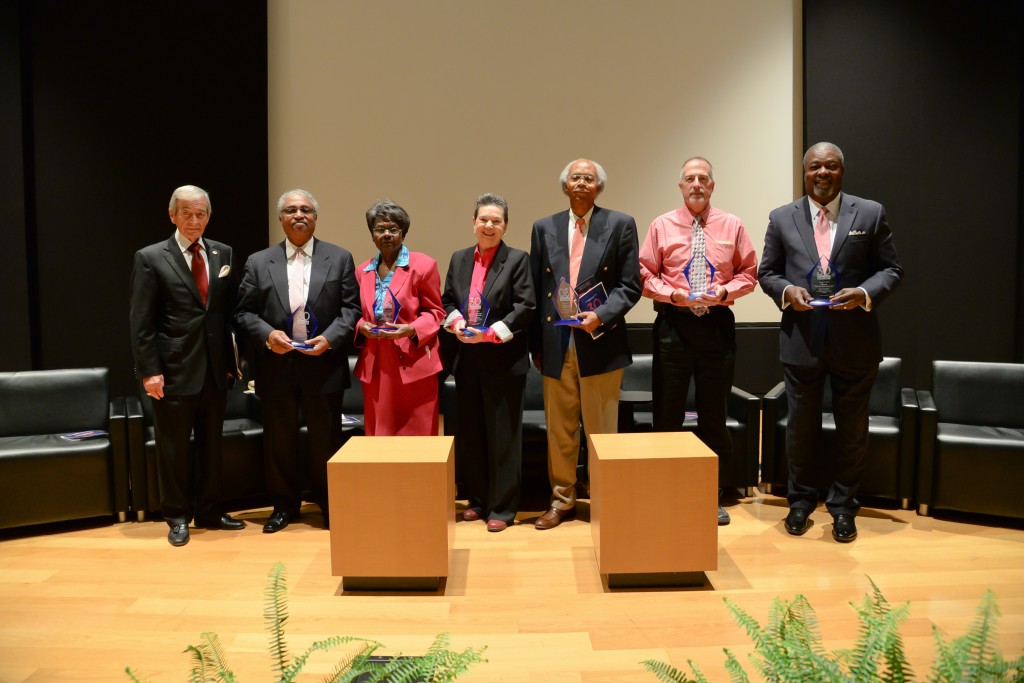
Thirty years ago, sci-fi classic “Back to the Future” hit theaters. It was also three decades ago when the City of Jackson switched to a mayor-council form of government, and, on Thursday, Jackson State University led an audience “back to the past” to reflect on that watershed moment.
JSU’s Institute of Government (IOG), along with members of the City of Jackson, Jackson Public Schools and others assembled in the Jackson Convention Complex to reflect on “Milestones in Democracy: Thirty Years of a More Representative Government in Jackson.”
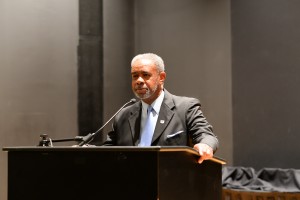
IOG’s executive director Dr. Otha Burton Jr. said the purpose of the event was to recognize transformative city elections of 1985 and 1997. The event paid homage to Jackson’s first City Council members, who, in 1985, also became the local government’s first diverse group of elected representatives. One member of that pioneering group continues to serve today: Margaret Barrett-Simon, Ward 7.
Also, presentations were made by JSU’s Margaret Walker Center and the Center for University-Based Development, detailing the history of race, racism, disenfranchisement and events leading to the first African-American mayor.
Mayor-council system takes root
[dropcap]I[/dropcap]N 1985, after years of litigation, led by notable leaders such as state Sen. Henry Kirksey, an election was held under the City of Jackson’s first mayor-council system. Mayor Dale Danks Jr., who also pushed for the change, was re-elected as the city’s top CEO under the new form of representative government.
Then, in 1997, the city made another bold step. It elected Harvey Johnson Jr. as its first African-American mayor.
The restructuring in 1985 ushered in women and African-Americans for the first time since Reconstruction, bringing an end to a citywide elected mayor-commission form of government with just three people. The new structure resulted in a strong mayor-council form of government with seven Council members.
[pullquote align=”right”]”People in this community helped my administration lead the change to a form of government that was not only legally required but morally required.” — Former Mayor Dale Danks Jr.[/pullquote]Kirksey was joined in the crusade for change by other state lawmakers and civic leaders such as Hillman Frazier, Fred Banks and Credell Calhoun.
JSU’s Burton said, “We don’t want to just look back. But if we do look back, we want to have an appreciation and understanding of what took place in 1985 and 1997. Those events have a bearing on what we do in the future. We need to couch it in the proper perspective.”
City’s first African-American mayor
[dropcap]F[/dropcap]ORMER mayor Johnson recalled his history-making election.
“Historically, I have to thank Sen. Kirskey for his vision and tenacity for moving the city forward to change the form of government,” Johnson said. He also applauded Danks by acknowledging that the city’s former top executive endured a lot of pressure. “Had Mayor Danks not done his job, we would not have been able to do our jobs as successors.”
Of his own administration, Johnson said, “There was a lot of pressure to make sure, administratively, we ran a tight ship.”
He particularly thanked voters for electing him in 1997, 2001 and 2009. “It was an honor to be the first African-American mayor. I often tell the story about how enthusiastic I was after losing in ’93 and coming back in ’97 with a lot of energy and determination to win.
“On primary day, I was working near the polls, shaking hands, passing out cards. I went up to this elderly black lady who started shuffling to the polling place. I said, ‘Ma’am, my name is Harvey Johnson. I’m running for mayor, and I need your vote.’ She said, ‘Baby, put that card away. I may not see me a black president. But I’m going to see me a black mayor.’ ”
Johnson said if that black lady lived another 11 years not only would she have seen a black mayor but she would have seen a black president.
“She didn’t say it as a racist remark. She felt that it was her time to see someone who looked like her, who she felt would deeply represent her interests, particularly after she and her friends for many years had been denied the right to vote.”
High expectations, high anxiety
[dropcap]J[/dropcap]OHNSON said during his inauguration in July 1997, longtime Atlanta Mayor Maynard Jackson was in attendance and offered sage wisdom.
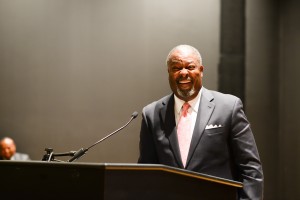
“Maynard said to me, ‘Mayor Johnson, you’re going to face high expectations from the black community and high anxiety from the white community. And, it’s that balance that you will have to work with. … It’s not an easy task.’ ”
Danks, who served as the city’s mayor for 12 years, said he also received support, advice, guidance and character from pillars in the community. He cited Dr. James Anderson, Dr. Aaron Shirley and Dr. Jessie Mosley. “They, and other people in this community, helped my administration lead the change to a form of government that was not only legally required but morally required.”
The former mayor said, “When I went into office in 1977 there was ongoing litigation related to changing the form of government. I listened to my legal department as it was helping to defend this lawsuit with several other private law firms. After a while, it became very obvious to me that something was wrong,” Danks said.
A consensus for change
[dropcap]“I[/dropcap]T was wrong because the government in the city of Jackson at that time was not representative of the people who lived Jackson. … I called together an ad hoc committee consisting of almost 100 people. Their purpose was to divide up into four separate groups because under state law at that time there were four different forms of government applicable to municipalities in the state of Mississippi.”
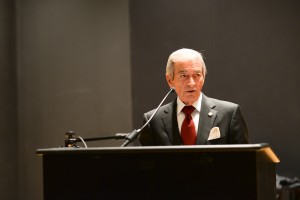
Danks said the consensus of the committee, which was made up of a cross-section of people from the entire city, recommended that we change our form of government from a commission form of three people to a strong mayor-council government with seven council people.”
After some maneuvering with the private sector, he said Jackson selected its new form of government.
“While there have been trials and tribulations since 1985, a lot has been accomplished,” Danks said. “The new system of government helped me as the mayor of the city and helped the City Council to hear the public better.”
Time of excitement, promise
[dropcap]M[/dropcap]AYOR Tony Yarber also acknowledged the contributions of his predecessors, telling Johnson that being first is more than a notion.
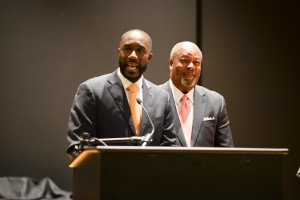
“You had to be mayor for black folks and white folks. There’s a cloud of unreasonable expectations on the shoulders of the first,” the mayor said.
“When you are African-American, there is always the expectation to be cool, calm and collected,” said Yarber, who also briefly served as an “anger translator” for Johnson in a humorous parody in which Yarber poked fun at his predecessor’s detractors.
Meanwhile, Dr. E.C. Foster, president of the 1985 City Council, described the mid-1980s as a time of excitement, promise and change.
“There was healthy tension between the executive branch and the City Council.”
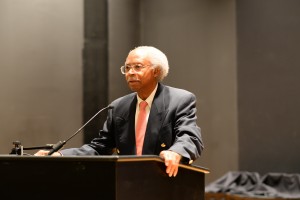
Foster offered a litany of accomplishments by his elected colleagues. They included a vigorous push for minority and women businesses and a reconstruction of the way general obligation bonds were executed. This helped to include more African-Americans in the process, he said. Foster also noted that the Council passed ordinances allowing businesses to open on Sundays, honoring the national holiday of Martin Luther King Jr. and allowing restaurants and clubs to remain open past midnight.
Arguably, Foster said, the 1985 City Council may have been one of the best in Jackson’s history, as was said then of the fierce Chicago Bears football team – particularly with legendary JSU alum Walter Payton on the team.
